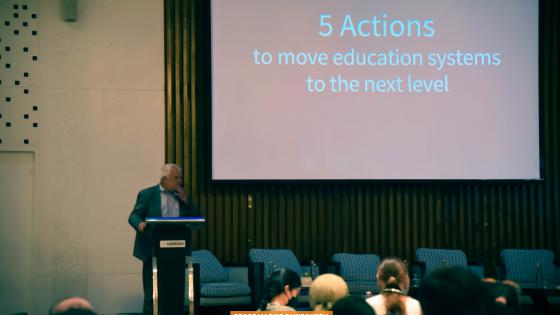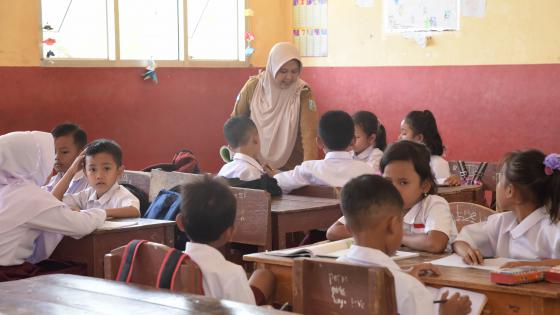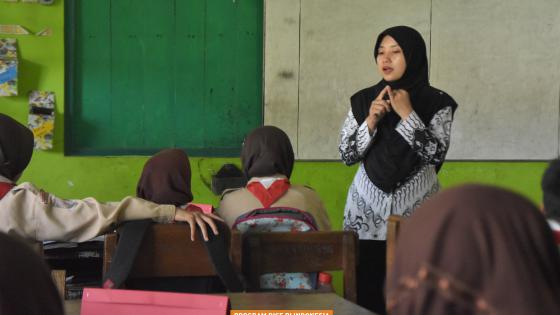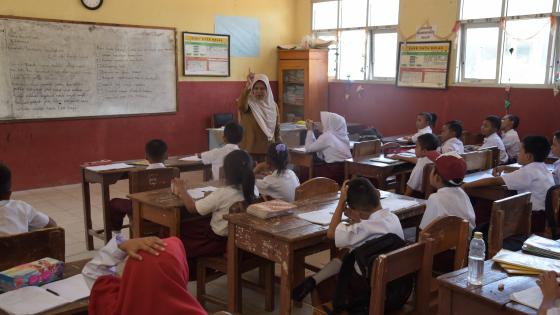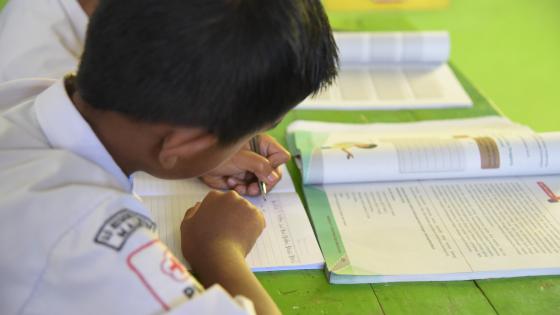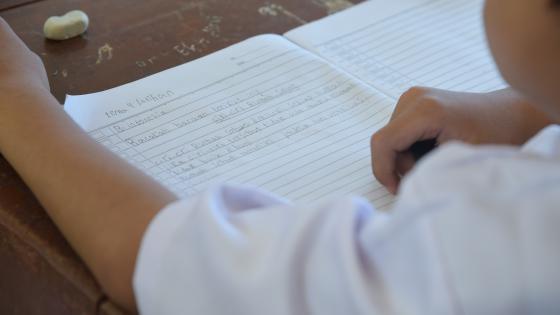An illustration of a student who is accessing study materials on a laptop.
![]()
-
This article was originally posted on The Conversation Indonesia and has been translated by RISE team.
-
The world is entering the fourth digital revolution or industrialisation. The use of the Internet of Things (IoT), big data, cloud database, blockchain, and others will change the pattern of human life.
Students, for example, can easily find information through the internet to complete their school assignments. In fact, for certain conditions, such as in the frontier, outermost, and underdeveloped areas, gadgets can replace parents and teachers. In areas such as these, most parents are not able to guide their children to study. Good teachers are rarely found.
In the future, teaching students could also be the function of digital companies. Children can learn anywhere other than at school.
Is it true that gadget is bad?
More than 93 million Indonesians use the internet now, and around 71 million have cellular phones. They tend to be connected to digital media. Some are young people fond of changes and like to communicate and be connected.
Most are new generations experiencing a shift from old habits to new traditions that are not easy to predict. The development of the digital world is so dynamic that gradually it not only affects but also changes people's lifestyles which none of us can avoid.
The world does not need to wait a century to shift to the digital age. School children today will face digitalisation as adults in the future. It is estimated that 65% of the current occupations will be replaced by new types of currently unimaginable jobs. For example, when projector equipment is applied to a computer or cellular phone, projector factories and even television stations will soon be closed, and cinema visitors would also disappear.
Many education stakeholders, including bureaucrats, community leaders, and parents are concern about the negative impact of children using cellular phones. Many schools forbid the students from bringing their cellular phones.
In fact, as a means of communication, regardless the use of a device is good or bad depends on the user. Support from all relevant parties concerning efforts to minimise the negative impact of digital media is certainly needed. However, the use of gadgets for positive purposes must be given the widest possible space.
Technological innovations for education
One area of digital technology that can provide solutions to community problems is in the education sector.
There are still many communities in Indonesia where the majority of parents are unable to guide their children to study because they have low education or are rarely at home.
Also, many teachers have questionable teaching abilities, as indicated that more than half of them did not pass the teacher competency test.
As a result, many Indonesian children receive low quality teaching and education. According to the 2016 PISA (The Programme for International Student Assessment) test, their reading, mathematics, and science skills are below Singapore, Vietnam, Malaysia, and Thailand.
A digital technology-based company called Ruangguru, seeks to provide solutions to education problems in Indonesia by providing a learning platform via gadgets.
Indonesia has 3.1 million permanent teachers plus more than 700 thousand honorary teachers. Only half of them have adequate competencies to teach well. Some of the best group teachers have great potential to become partners in digital learning companies.
Digital company Ruangguru, founded in 2014, has recruited through a rigorous selection of around 150 thousand teachers to join their platform. These teachers becomes Ruangguru's partners as tutors helping students to understand the subject matters.
The tutoring module for each material is presented visually and can be downloaded by users. Students pay for each study package they choose, ranging from tens of thousands to millions of rupiah.
Teachers or tutors earn according to the number of users who signed up for the learning packages.
In early 2018, more than seven million junior secondary and senior secondary school students were users. The number of junior secondary and senior secondary school students in Indonesia is 14.6 million plus 4.8 million vocational school students. Various Ruangguru applications ranked first in the education category on Google Play and iOS App Store.
One example of services provided by Ruangguru is Ruangguru "On-The-Go", an application that makes it easier for students to watch videos without internet quota.
Ruangguru also provides thousands of video materials, discussions, and exercises from various subjects for each grade level, which are easy for students to access. The video was designed and produced by Ruangguru with selected tutors.
A Ruangguru product called “digitalbootcamp” is a group learning platform with guidance from a standby tutor. This study chat group uses a complete tutoring module, practice questions and tryouts, as well as access to video materials available in “ruangbelajar” (studyroom). Through the "digitalbootcamp" service, Ruangguru has succeeded in helping more than 96% of its participants achieve an average score above 70 in the 2017 national examination.
Ruangguru also offers several other products such as “ruanglesonline” (online tutoring room, a tutoring service as needed). Through “ruanglesonline”, students can send photos of questions and write questions related to the problem. Within three minutes, they will be connected to a tutor will help the student learn via chat for 30 minutes at Rp20,000.
Meanwhile, the “ruangles” (tutoring room) service provides thousands of quality private teacher profiles that students can choose to guide them to study at home or other agreed places. Students can also convey their learning needs and Ruangguru will then choose the most suitable tutor for the student. The private teacher will then prepare lesson plans according to the student's needs and routinely report learning progress to student's parents. “Ruangles” is the largest private tutor search portal in Indonesia.
Teachers can also take advantage of the “ruangkelas” application, a learning management system service provided free of charge to teachers and students in Indonesia.
This application helps teachers to give assignments and monitor student learning progress. Teachers can give assignments and exams to students online anywhere and anytime. Teachers can monitor the results of assignments done by students directly and easily. Teachers can evaluate students' abilities for each subject automatically.
Potential for explorations
“School” comes from the Latin word, which literally means spare time. School is an activity for children’s and youth’s spare time amid their basic rights to play and enjoy their youth.
In its development, the meaning of school changed to an institution where the teaching process between students and teachers needed a place and support for various learning aids in a bureaucratic atmosphere.
In the future, with the development of technology, students can learn anywhere, and teachers can become facilitators and moderators of learning without being constrained by physical space. Ruangguru has shown a brief picture of how this can be done.
Going forward, Indonesia still needs a lot of startup development that offers specific services, such as digital companies “Sanggaripa,” “Sanggarips,” “Sanggarhitung, “Sanggarbaca,” and others to teach students, “Lemaripustaka”, which provides reading materials for students, as well as “Pondoksantri” and “Kitabkuning”, which promote various madrasah and pesantren lessons.
The Indonesian government is currently facilitating the National 1000 Startup Digital Movement (Gerakan Nasional 1000 Startup Digital) to encourage the development and use of technology to provide innovative solutions.
However, what’s more important than the development of digital startups is the equitable distribution of digital infrastructure development throughout the country. In order for Indonesia to take advantage of technological developments in the digital era, large capacity and superfast internet support are needed in all villages and schools.


